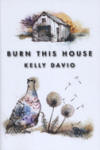Burn This House
The title of Kelly Davio’s debut collection establishes an expectation of anger, bitterness, perhaps violence. Burn this house. Burn it down. The book, however, is much more interesting than that simple emotion, although there are moments where anger slices through clearly.
The title of Kelly Davio’s debut collection establishes an expectation of anger, bitterness, perhaps violence. Burn this house. Burn it down. The book, however, is much more interesting than that simple emotion, although there are moments where anger slices through clearly.
The first poem is titled “Auguries”—conjuring up the idea of divination, omens, foretelling—and it does foretell some of the themes and recurring images of the book. The poem opens with “a gong at the window. Not the sparrow / who occasionally lobs himself at my smudged glass, / but a pigeon.” That warning gong precedes a violent storm in which the magnolia tree “tilts / for earth, drops its heavy blossoms to the dirt” and light poles “yaw in gathering wind.” After the storm the speaker goes outside to survey the damage: “I walk to the street, rubber-booted, make / appraisal of each static hurt. To what / significance such eroded things?”
That opening poem establishes Davio’s clear narrative voice; there is no doubt about what happens in the piece, and the language is rhythmic and precise. It also sets up birds as a key image. The sparrow, peripheral in “Auguries,” takes center stage a few poems later in “The Eye on the Sparrow” with its titular allusion to the Christian notion of God watching over even the sparrows. Davio’s sparrow, on the other hand, seems to have slipped through the cracks of His vigilance as it crashes into the speaker’s window “like an aimless bottle rocket . . . with feather sparks flying off in a trail / of smoke.” The speaker also turns her back on the bird, saying she doesn’t want to see it thrash in her hands, doesn’t want to “hear it / rasp a sound like mom from its cracked beak,” doesn’t want to see it die.
The sparrow is not the only one who calls “mom” either; the house cat also cries “a note that sounds like mom,” and the speaker of “Envy” does as well: “Today, Mother, you stretched a telephone wire / tighter than my childhood muscles / to tell me about your sons.” The mother reappears in other poems too, fleetingly and without a lot of sympathy. More sympathetic and more interesting is the speaker’s relationship with her sister—sometimes competitive, sometimes loving, and ending tragically in the poem “Chastity.”
The bird, the clarity, the precise and thoughtful language of “Auguries”—these carry through the book, along with that final question: What is the significance of this destruction? What do these broken pieces mean? The theme of memory, of the attempt to draw meaning from the past, continues explicitly in “The Way I Remember” and “Cleaning Out” among others, and it informs many more poems in subtle ways.
Even the rubber boots of “Auguries” find an echo later on, in the poem “Greed.” The poem moves from the first pair of boots the speaker received, “meant for snow, / though we lived in a drought town in a dry season”; to the ones she tried to lace lightly enough to bind her feet; to the steel-toed boots she bought when she left home, “heels meant for kicking”; and finally to a new pair which cost as much as all the others combined. The boots become symbolic, their leather imbued with the weight of growing up, the search for independence, and some ambivalence about that achievement.
The book is not all memory and storm, however; moments of humor brighten the collection in several places. In the longer piece “Why Rent is Cheap in Shoe Lane,” for example, the speaker describes her surroundings with a wry amusement. One section ends with flies banging against a window (more deliberate than the birds); the speaker says ordinarily she would open the window to let them out, except that “someone has taken the chardonnay / from my half-shelf of the mini-fridge. / My mood is inhumane.”
Although a few poems, particularly in the final section, seemed vague or disconnected from the book, others feel almost too clear; they drive their points home with morals or neat conclusions. But this is a small flaw in a book that remains tantalizingly unclear. The past is hinted at more often than it’s explained; the birds and boots and other images provide much of the story. This makes sense when we consider the book’s title. “Burn This House,” the speaker says, the title also of the closing poem. “Tell the rescuers they are not wanted. / Raise a hand to stop the water-bearers.” Let it burn. “Allow each column of timber to stray / from notions of form and size, catching / flakes of fire on your tongue.” After the fire, all that’s left are fragments, memories, the images in our minds.





